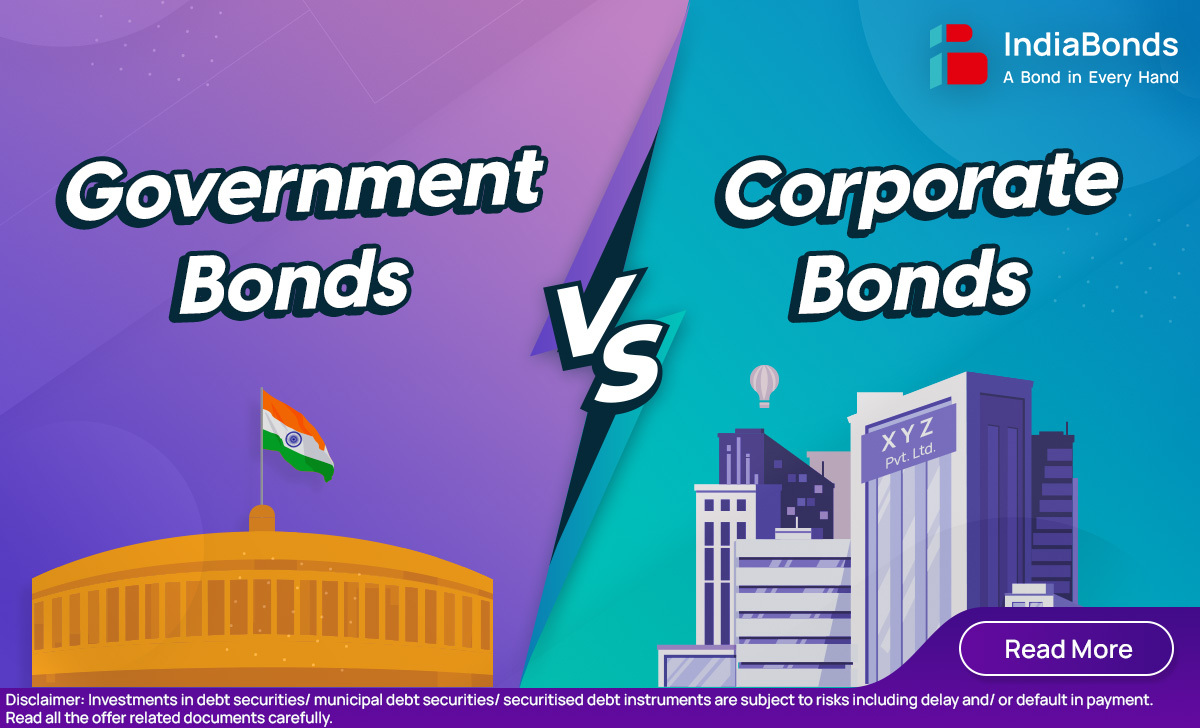Government Bonds vs. Corporate Bonds

The only free lunch in finance is diversification – Harry Markowitz
How impactful is the quote by the Nobel Prize laureate and pioneer of the Modern Portfolio Theory in today’s world? Portfolio diversification is at the heart of a successful investment strategy. By spreading investments across various assets, one can navigate the ups and downs of the investment journey and achieve respectable returns. Whether the objective is to accumulate wealth or preserve capital, maintaining a well-balanced asset mix is crucial. Fixed income securities, in particular, provide a sense of security and stability. When included in one’s investment portfolio, they form a solid foundation for financial investments. As an investor, you have a plethora of choices when constructing your portfolio. No single instrument surpasses another or guarantees exceptional returns on its own. However, by combining different instruments in the right proportions, you can reduce your portfolio’s vulnerability to market risks. In fact, the portfolio concentration is directly linked to an investor’s perspective on financial markets. If you aim to create a diversified portfolio, it’s imperative not to overlook the importance of including corporate and government bonds. These bonds are the giants of the fixed-income securities. This article aims not to compare their pros and cons but to provide a comprehensive overview of these instruments. This knowledge will empower you to make informed decisions when selecting the right asset mix for your portfolio.
What are Government Bonds?
Government bonds or more popularly known as government securities (gsecs) are issued by the Reserve Bank of India (RBI). Indian government both central and state requires funds to meet its fiscal expenditure. By investing in these bonds, you are essentially lending your money to the government for a prescribed period in return for guaranteed interest payments. Their unwavering reliability, stemming from governmental backing, renders them a haven for risk-averse investors. They can be considered risk-free instruments in the Indian financial markets and serve as benchmarks for pricing other debt instruments. Financial institutions, banks, mutual funds, and pension funds also invest in government securities. Examples of government bonds in India include Dated Government Securities, Treasury Bills, Cash Management Bills, State Development Loans, Sovereign Gold Bonds (SGB), etc.
What are Corporate Bonds?
Companies issue bonds to raise funds for operational expansion and other business needs. When you invest in a corporate bond, you’re lending money directly to a company. The returns on corporate bonds generally outpace those of government bonds, reflecting the associated higher risks. Meticulous creditworthiness assessments of the companies issuing these bonds are crucial for prudent investment decisions. One of the key advantages of investing in corporate bonds is the potential for higher yields compared to government bonds. Since corporate bonds carry credit risk, investors demand a higher return to compensate for the additional risk. As a result, corporate bonds typically offer higher yields, making them attractive to income-seeking investors. Examples may include NCDs, bonds issued by MFIs, NBFCs, HFCs, etc.




Government bonds vs Corporate bonds – Clash of the Titans
Backed by the government, government bonds are considered one of the safest fixed-income investments in India, providing predictable interest payments and some type (including tax-free bonds) offer tax-exempt interest income. G-secs are generally highly liquid, allowing for easy buying and selling in the secondary market. These bonds are suitable for risk-averse investors pursuing capital preservation and steady returns, as well as long-term investors aiming for financial goals like retirement planning. On the other hand, corporate bonds offer various forms to cater to investors’ diverse needs and preferences. They can be classified based on the issuing company’s credit rating, industry sector, maturity date, or coupon structure. Investing in corporate bonds carries certain risks such as credit risk, which refers to the possibility of the issuing company defaulting on its debt obligations. Other risks include interest rate risk, liquidity risk, and market risk, which can impact the bond’s value and performance over time. To mitigate these risks, investors often diversify their bond portfolios by investing in bonds issued by companies across different sectors and credit ratings. Additionally, conducting thorough due diligence on the issuing company’s financial health, business fundamentals, and industry outlook can help investors make informed investment decisions.
Conclusion
We are currently experiencing a time when technology has revolutionized investing. With the emergence of seamless cutting-edge technology, individuals can construct their own portfolios online and seek guidance from a financial advisor when necessary. Furthermore, by leveraging this flexibility, investors can align their bond portfolios with their risk tolerance, investment objectives, and income requirements. The combination of the ultimate safety of government bonds and the high yield of corporate bonds may result in a ‘risk-free inflation-adjusted return.’ Focusing solely on one asset class or investing based on ‘tips’, trading without any strategy exposes your capital to various risks. However, achieving an appropriate asset mix tailored to your financial goals and time horizon is a key to successful investing. It’s not just about asset classes; investors can also diversify across sectors, geographical regions, companies, and credit quality. Whether it’s comparing corporate vs government bonds or constructing an ideal portfolio mix, investors should aim for diversification rather than simply chasing returns.
FAQS
Q. What is asset mix / portfolio mix?
A. Asset mix, or portfolio mix, refers to how investments are divided among different asset classes like stocks, bonds, cash, and alternatives. It’s a key strategy to balance risk and return in an investment portfolio.
Q. Difference between government bonds and corporate bonds
| Aspect | Government Bonds | Corporate Bonds |
| Issuer | Indian Government | Indian Private Corporations |
| Risk | Lowest within the debt securities space | Varying levels, dependent on the company’s creditworthiness |
| Returns | Relatively lower | Potentially higher to compensate for risk |
| Liquidity | Highly liquid | Varies based on the specific company and bond |
| Taxation | Tax benefits applicable for certain bonds such as tax-free and SGBs | Interest is taxable |
Q. Corporate bonds vs government bonds ; which is better?
A. Government bonds are generally considered safer due to backing by the government, offering stability but lower yields. Corporate bonds, on the other hand, often provide higher yields but come with relatively higher risk as they depend on the issuing company’s financial health. The choice between the two depends on investor risk tolerance and investment goals.
Disclaimer: Investments in debt securities/ municipal debt securities/ securitised debt instruments are subject to risks including delay and/ or default in payment. Read all the offer related documents carefully.













































